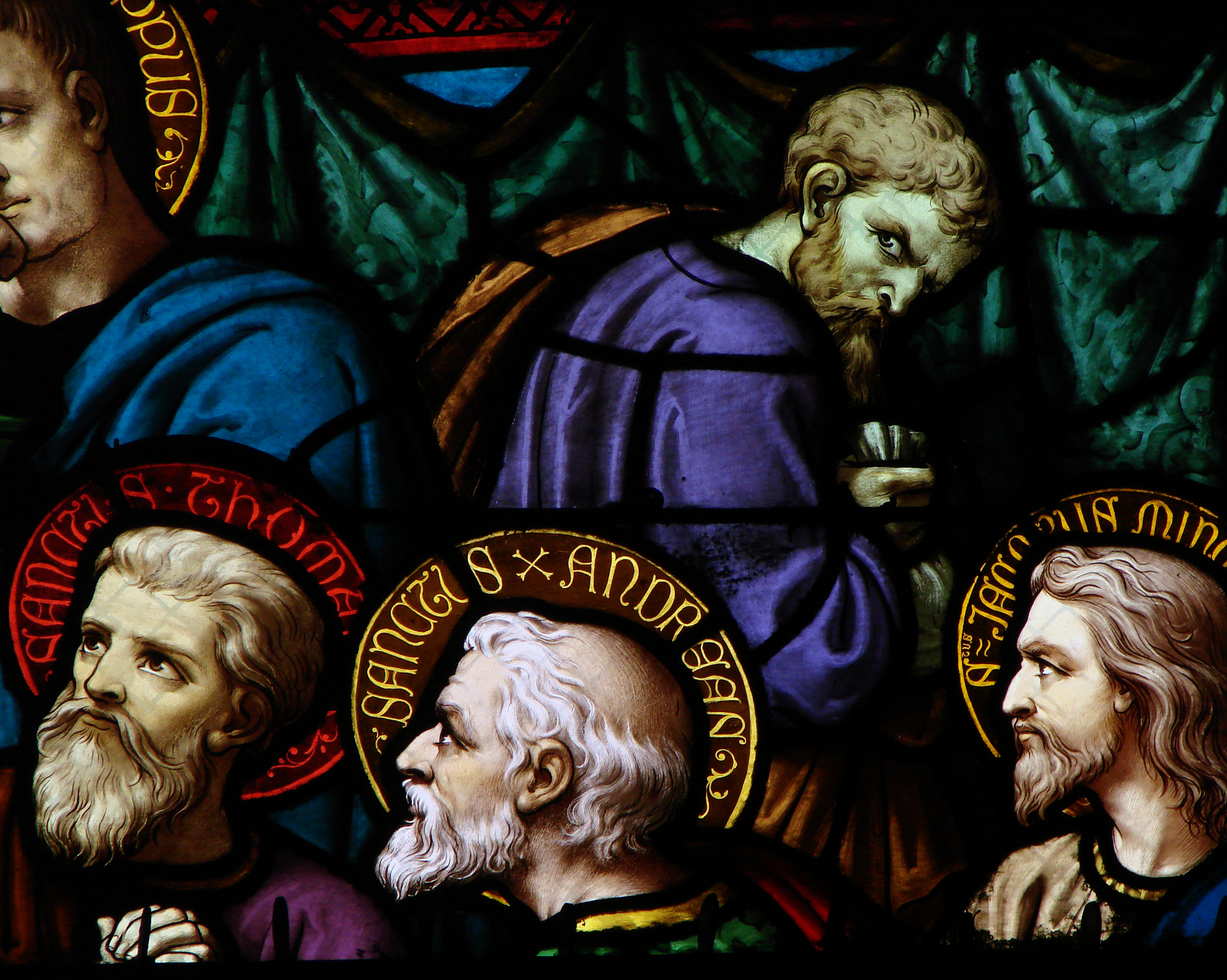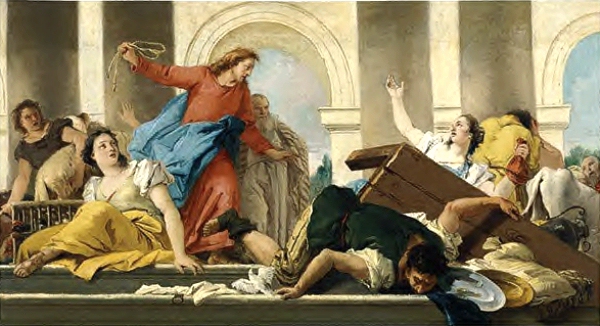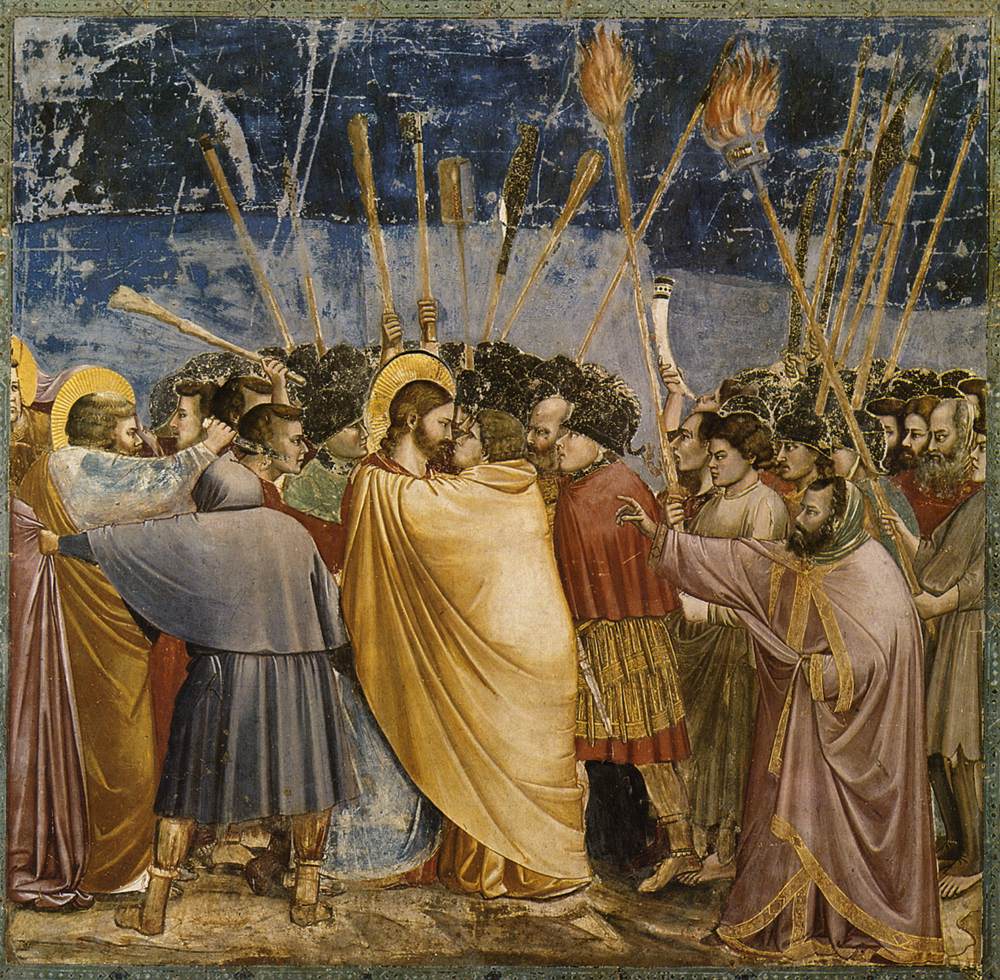Tomorrow is Palm Sunday, the first day of Holy Week, which is the climax of the liturgical year. I'm planning not to write much from tomorrow until the end of the Octave of Easter (which in most Roman Rite churches is observed as Divine Mercy Sunday; it is also known as Low Sunday, probably in comparison to the spiritual height represented by Easter Sunday itself, and as
St. Thomas Sunday). But I wanted to write a few things here about the fascinating character of Holy Week; I've included some meditative readings as well.
Also, if you're within driving distance of Baltimore, I've included the address and service times of my parish, which is an Anglican Use church, an unusual subset of Catholicism with a liturgical style that I cherish.
816 North Eutaw Street, Baltimore (parking in the neighboring lot at the corner of Martin Luther King Jr. Boulevard and Madison Street, or on the streetside)
Palm Sunday: Masses at 8 am and 10 am
Spy Wednesday: Tenebrae prayer service at 7 pm
Maundy Thursday: Mass at 7 pm, followed by Eucharistic watch until midnight
Good Friday: liturgy at 12 noon
Holy Saturday: Easter Vigil at 9 pm
Easter Sunday: Masses at 8 am and 10 am
Palm Sunday
This day is named for the palm branches with which the people of Jerusalem greeted Jesus,
when He entered the city before Passover the year that He was crucified. It is traditional to begin the Mass this day with a procession, starting somewhere outside the church, carrying palm leaves (which are later collected and burned to produce the ashes used in Ash Wednesday liturgies, so that every paschal cycle is organically connected to the last). This is one of the few events that both the Synoptic Gospels
and John report, John's emphases being usually so different from the other authors.
The prophecy from Zechariah alluded to by Matthew, Luke, and John, which Jesus obviously had in mind in choosing to ride into Jerusalem on a donkey's foal, does represent a victorious king, entering the royal city in triumph over the nations that were hostile to Israel; the disappointed expectations aroused in the populace by this symbolism may have been part of why they so easily turned on Jesus when He was arrested and brought before Pilate, as is recounted in the Passion narrative (read or sung in differing parts by the celebrant, appointed lectors or cantors, and the congregation as a whole) that forms the Gospel reading for Palm Sunday.
In both John and Luke, within the immediate context of the triumphal entry, Jesus refers to His imminent death; in Luke, He begins to weep over Jerusalem as they approach the city from Bethany, and in John, He uses the famous lapidary that a seed must fall into the ground and die to bear fruit -- then going on in a favorite Johannine theme to say,
I, if I be lifted up from the earth, will draw all men unto me, identifying the Cross itself with His exaltation. That exaltation continues, of course, in the Resurrection, the Ascension, and the sending down of the Holy Ghost at Pentecost, but John consistently casts the Cross in the light of the first part of His glorification (an idea very much preserved in the Christian East, where the
Christus Victor motif is far more pronounced than in most Western images of the Passion, which tend to emphasize the anguish). This to-us-strange concept of the Cross, especially when viewed together with Jesus' voluble grief over the city that would murder Him, brings me to the meditation I've selected for Palm Sunday.
The Church can reasonably be justified therefore if she turns the most merciful face or aspect towards men; but it is certainly the most merciful aspect that she does turn. ... A man simply taking the words of the story as they stand would form quite another impression; an impression full of mystery and possibly of inconsistency; but certainly not merely an impression of mildness. It would be intensely interesting; but part of the interest would consist in leaving a good deal to be guessed at or explained. It is full of sudden gestures evidently significant except that we hardly know what they signify; of enigmatic silences; of ironical replies. The outbreaks of wrath, like storms above our atmosphere, do not seem to break out exactly where we should expect them, but to follow some higher weather-chart of their own. ... Relatively speaking, it is the Gospel that has the mysticism and the Church that has the rationalism. As I should put it, of course, it is the Gospel that is the riddle and the Church that is the answer. But whatever the answer, the Gospel as it stands is almost a book of riddles. -- G. K. Chesterton, The Everlasting Man, pp. 188, 190
Fig Monday
This day is named for a passage in the Gospels that we often seem to forget:
And on the morrow, when they were come from Bethany, he was hungry: and seeing a fig tree afar off having leaves, he came, if haply he might find any thing thereon: and when he came to it, he found nothing but leaves, for the time of figs was not yet. And Jesus answered and said unto it, No man eat fruit of thee hereafter forever. And his disciples heard it. And they come to Jerusalem: and Jesus went into the temple, and began to cast out them that sold and bought in the temple ... And when even was come, he went out of the city. And in the morning, as they passed by, they saw the fig tree dried up from the roots. And Peter calling to remembrance saith unto him, Master, behold, the fig tree which thou cursedst is withered away. And Jesus answering saith unto them, Have faith in God. -- Mark 11.12-15a, 19-22
There follows the lesson of having the "faith that can move mountains" to which we are so accustomed from Sunday school and refrigerator magnets, but, uh, holy crap, Jesus. You blasted a fig tree because it didn't have the snack you wanted? That's kind of terrifying.
I for one don't propose even to try to plumb the spiritual significance of this, Jesus' sole miracle of destruction (unless one gives credence to some of the infancy gospels, popular Christian literature that was not considered Scripture partly because they were too late to be of apostolic authorship and partly because they were
ravingly insane). I would say two things that may cast some light on it, though. The first is that this passage from Mark, which here likely represents the history chronologically (
Matthew liked arranging things by topic, and Luke doesn't mention the blasting of the fig tree), sandwiches the famous cleansing of the Temple in between the pronouncement of the curse and the Apostles noticing its effects. One of the prophets' favorite metaphors for Israel was that it was God's garden or field; the parable of the vineyard's tenants that follows within eight verses of the close of the fig tree passage in Mark suggests that this may have been an enacted parable about the unfruitfulness and consequent spiritual death of the Jewish religious establishment, represented by the Sadducees and Pharisees who would shortly crucify Him.
The other thing is, strictly speaking, not something that I would say, but the meditation I've chosen.
"For He visits the sins of the fathers upon the children unto the third and fourth generation of them that hate Him, and shows mercy unto thousands of them that love Him and keep His commandments." Here is a statement of fact, observed by the Jews and noted as such. From its phrasing it might appear an arbitrary expression of personal feeling. But today, we understand more about the mechanism of the universe, and are able to reinterpret the pronouncement by the "laws" of heredity and environment. Defy the commandments of the natural law, and the race will perish in a few generations; co-operate with them, and the race will flourish for ages to come. ... Scattered about the New Testament are other statements concerning the moral law, many of which bear a similar air of being arbitrary, harsh or paradoxical: "Whosoever will save his life shall lose it"; "to him that hath shall be given, but from him that hath not shall be taken away even that which he hath"; "it must needs be that offenses come, but woe unto that man by whom the offense cometh" ... We may hear a saying such as these a thousand times, and find nothing in it but mystification and unreason; the thousand-and-first time, it falls into our recollection pat upon some vital experience, and we suddenly know it to be a statement of inexorable fact. ... The cursing of the barren fig-tree looks like an outburst of irrational bad temper, "for it was not yet the time for figs"; till some desperate crisis confronts us with the challenge of that acted parable and we know that we must perform impossibilities or perish. -- Dorothy Sayers, The Mind of the Maker, pp. 12-13
Temple Tuesday
This name commemorates the time spent by Jesus teaching in the Temple during Holy Week. The exact chronology of the week is a matter of considerable scholarly debate, but, if we take the liturgical structure as being as close to what actually happened as makes no difference (and there is actually a scholarly case to be made for doing so), then Sunday, Monday, and Tuesday were spent teaching in the Temple. This Tuesday would likely have been when Jesus delivered
the Seven Woes to the scribes and Pharisees in Matthew 23. This would also, taking our theoretical schedule in combination with Matthew 26.1-2, be the day on the evening of which Jesus pronounced the Olivet Discourse, in which He predicted the destruction of the Temple and His own return, and told several frightening parables of the Second Coming: those of the Flood, the master and his servants, the wise and foolish virgins, the talents, and the sheep and the goats.
For the meditation, I have chosen something peculiarly Anglican in character. In the 1662 version of the Book of Common Prayer, there is a service specially designed for Ash Wednesday called
A Commination, Or Denouncing of God's Anger and Judgments Against Sinners, which itself refers to the ancient custom -- which ceased in the Catholic Church when the Irish introduced the idea of private Confession and penances, thanks be to God! -- of imposing public penance upon those Christians who sinned, because the primitive Church was way hardcore. It is, of course, easy to slide into a judgmental attitude if we think too exclusively of the wrath of God; but it is profitable to consider it at times -- more as it relates to ourselves than to other people, since we cannot repent of other people's sins -- and, particularly, to note that it is always related by the Church's doctrine to repentance rather than treated in isolation. I have therefore put here some of the closing prayers from the Commination for reflection.
O Lord, we beseech thee, mercifully hear our prayers, and spare all those who confess their sins unto thee; that they, whose consciences by sin are accused, by thy merciful pardon may be absolved; through Christ our Lord. Amen.
O most mighty God, and merciful Father, who hast compassion upon all men, and hatest nothing that thou hast made; who wouldest not the death of a sinner, but that he should rather turn from his sin, and be saved: Mercifully forgive us our trespasses; receive and comfort us, who are grieved and wearied with the burden of our sins. Thy property is always to have mercy; to thee only it appertaineth to forgive sins. Spare us therefore, good Lord, spare thy people, whom thou hast redeemed; enter not into judgment with thy servants, who are vile earth, and miserable sinners; but so turn thine anger from us, who meekly acknowledge our vileness, and truly repent us of our faults, and so make haste to help us in this world, that we may ever live with thee in the world to come; through Jesus Christ our Lord. Amen.

![]()
Spy Wednesday
This name refers to Judas Iscariot. Two possible etymologies have been put forward for the name
Iscariot: one derives it from the Latin
sicarius, a small type of dagger, and would suggest that he, like St. Simon the Zealot (not to be confused with St. Peter, whose given name was also Simon), had revolutionary leanings. The other, which I find more plausible on linguistic grounds, is that it represents a Greek transliteration of the Hebrew-Aramaic phrase
ish Kerioth -- "the man from Kerioth," Kerioth being a city in Judaea. This, if true, would probably make Judas the only disciple who came from Judaea proper; the rest were Galileans, like Christ Himself.
Jesus' own treatment of Judas Iscariot is mysterious, by our standards, though it is very characteristic of Him. Though one could hardly ever
foresee anything Jesus would do, one can see what He did do and think instantly, "Of course. He
would do that." He specifically chose him as one of the Twelve, though
He knew he would betray Him, and when the Last Supper was celebrated, He told Judas to do what he had to do quickly. It has even been suggested that
Christ's dipping the bread and handing it to Judas was not only an inconspicuous way of answering St. John's question, but also
a way of showing peculiar regard to the recipient -- a final expression of His special love for Judas before the betrayal was finally enacted.
It is customary to present a form of the Office of Readings (traditionally prayed by some monastic orders in the wee hours of the morning) on the night of Spy Wednesday; this form of the office is called
Tenebrae, a Latin word meaning
shadows. It's a spooky kind of service, and full of symbolic foreshadowings of the approaching death of Christ. It traditionally closes with the loud slamming shut of a Bible (or a similar sound), commemorating the closing of the tomb.
The meditation I have chosen is from
Murder In the Cathedral, T. S. Eliot's magnificent play about the martyrdom of St. Thomas Becket, who was killed by knights loyal to King Henry II of England in 1170 for obstructing the king's attempts to interfere with the Church's self-governance. The priests of the church attempted to bar the doors to prevent the knights from getting in, but Becket refused to allow this. Eliot gave him the following speech:
You think me reckless, desperate and mad.
You argue by results, as this world does,
To settle if an act be good or bad.
For every sin and every act
Consequence of good and evil can be shown.
And as in time results of many deeds are blended,
So good and evil in the end become confounded.
It is not in time that my death shall be known;
It is out of time that my decision is taken
If you call that decision
To which my whole being gives entire consent.
I give my life
To the Law of God above the Law of Man.
Unbar the door! unbar the door!
We are not here to triumph by fighting, by stratagem, or by resistance,
Not to fight with beasts as men. We have fought the beast
And have conquered. We have only to conquer
Now, by suffering. This is the easier victory.
Now is the triumph of the Cross, now
Open the door! I command it. OPEN THE DOOR!
Maundy Thursday
The word
maundy comes from the Latin phrase
Mandatum novum do vobis, "A new command I give unto you."
This command, to love one another, is the expression of the whole ethos of the New Covenant, as surely as the Ten Commandments were the expression of the covenant forged through Moses between Israel and God. The orders for the sacrifice which the Apostles were to perform thereafter had already been laid down ("This is My blood of the covenant ... Do this in remembrance of Me"), and the Sacrifice which would ratify its own representation, a representation that conveys what it symbolizes by being the reality it symbolizes, was about to take place. In the meantime, the new morality, and the spiritual grace that would effect it,
were explained.
The Maundy Thursday liturgy forms the first part of the Triduum (or "Three-Day Thing"). It is customary to open this liturgy, like all Masses, with the sign of the Cross, but not to close with it as is usual, because the Triduum is treated by Roman Catholics as a single liturgy -- beginning on Thursday, continuing through Good Friday, and concluding with the anticipatory Easter Vigil on Saturday, which does at last conclude with the sign of the Cross. Liturgically, it has an oddly two-sided character: on the one hand, it is the beginning of the great exaltation of Jesus and is the time when the Blessed Sacrament was instituted, and in honor of these things the
Gloria, which has not been sung throughout Lent, is again used in the Mass here; but at the same time, it is the very brim of the chalice of anguish of the Passion -- and this is anticipated during the Communion rite, in which the customary ringing of bells in honor of Christ in the Host is eliminated in favor of a
crotalus, a wooden "clapper" that at once marks and subdues the elevations.
Maundy Thursday Masses end in a procession: the Host is removed from the Tabernacle, where it is kept all year, and taken to what's called an Altar of Repose; this is done in a procession, joined by the whole congregation, commemorating the passing of Christ and the remaining eleven disciples out to the garden of Gethsemane the night before the Passion began, in which the self-gift preached by Christ in the washing of the disciples' feet was preached to the uttermost in His death.
We live in the sphere of death; we can reach out in thought into the sphere of the Resurrection, try to make approximations. But it remains something different that we never quite comprehend. This is because of the boundary of death, which closes us in and within which we live. But we can try to make approximations. One of these becomes apparent when we reflect that in the language of the Bible the word "body" -- "This is my Body" -- does not mean just a body, in contradistinction to the spirit, for instance. Body, in the language of the Bible, denotes rather the whole person, in whom body and spirit are indivisibly one. "This is my Body" therefore means: This is my whole person, existent in bodily form. What the nature of this person is, however, we learn from what is said next: "which is given up for you." That means: This person is: existing-for-others. It is in its most intimate being a sharing with others. -- Pope Benedict XVI, God Is Near Us: The Eucharist, the Heart of Life, p. 79

Good Friday
The events of Good Friday hardly need elucidation. The liturgy is again unusual: it is the only day in the year when no Mass is said (a Mass proper requires a consecration of the Eucharist, and Good Friday liturgies use Hosts consecrated in excess on Maundy Thursday and reserved for the purpose), and there is no Sacrament reserved in the Tabernacle.
I've chosen an unusually long meditation, partly because I have so little to say here, and partly because Chesterton's words (taken again from
The Everlasting Man, pp. 210-212) are so powerful.
In this story of Good Friday it is the best things in the world that are at their worst. That is what really shows us the world at its worst. It was, for instance, the priests of a true monotheism and the soldiers of an international civilization. ... So in that drama which decided the whole fate of antiquity, one of the central figures is fixed in what seems the reverse of his true role. Rome was almost another name for responsibility. Yet he stands forever as a sort of rocking statue of the irresponsible. Man could do no more. Even the practical had become the impracticable. Standing between the pillars of his own judgment seat, a Roman had washed his hands of the world.
There too were the priests of that pure and original truth that was behind all the mythologies like the sky behind the clouds. It was the most important truth in the world; and even that could not save the world. ... The Jewish priests had guarded it jealously in the good and the bad sense. As savage heroes might have kept the sun in a box, they kept the Everlasting in a tabernacle. They were proud that they alone could look upon the blinding sun of a single deity; and they did not know that they themselves had gone blind. ...
And as it was with these powers that were good, or at least had once been good, so it was with that element which was perhaps the best, or which Christ himself seems certainly to have felt as the best. The poor to whom he preached the good news, the common people who heard him gladly, the populace that had made so many popular heroes and demigods in the old pagan world, showed also the weaknesses that were dissolving the world. ... We have noted it already as the neglect of the individual, even of the individual voting the condemnation and still more of the individual condemned. It was the soul of the hive; a heathen thing. The cry of this spirit was heard also in that hour, 'It is well that one man die for the people.' ... The mob went along with the Sadducees and the Pharisees, the philosophers and the moralists. It went along with the imperial magistrates and the sacred priests, the scribes and the soldiers, that the one universal human spirit might suffer a universal condemnation; that there might be one deep, unanimous chorus of approval and harmony when Man was rejected of men.
There were solitudes beyond were none shall follow. There were secrets in the inmost and invisible part of that drama that have no symbol in human speech; or in any severance of a man from men. Nor is it easy for any words less stark and single-minded than those of the naked narrative even to hint at the horror of exaltation that lifted itself above the hill. ... And if there be any sound that can produce a silence, we may surely be silent about the end and the extremity; when a cry was driven out of the darkness in words dreadfully distinct and dreadfully unintelligible, which man shall never understand in all the eternity they have purchased for him; and for one annihilating instant an abyss that is not for our thoughts had opened even in the unity of the absolute; and God had been forsaken of God.
Holy Saturday
In a sense there is no Holy Saturday liturgy, strictly speaking. The liturgy that does take place, as the sun sets and the next day begins by Biblical reckoning, does not memorialize the time spent by Christ in the tomb, but begins the season of Easter. The peculiar character of Holy Saturday as such would, I suppose, be the Harrowing of Hell, a favorite subject of Mediaeval artists, but I know of no liturgical commemoration of it.
Here at the Vigil, at last, the time of the Resurrection begins, supreme among the mysteries. The singing of the
Alleluia is reinstituted before the reading or intoning of the Gospel, and the splendor of the celebration is throughout the greatest of the liturgical year. It is also traditionally at the Easter Vigil that new converts are received into the Church; I was received into full communion at the Vigil at the Catholic Student Center of the University of Maryland in 2008. The Easter Candle, symbol of the light of Christ, is dipped into the font (where Baptisms are performed), uniting the image of illumination with the image of life. The Litany of the Saints is chanted:
the Resurrection broke the boundary between the living and the dead, and, though we often
ask them for their prayers, we place special emphasis here upon
the coinherence of the living and the dead. And after everything is completed and our fast is changed to a feast, there is also a special hymn to the Mother of God, sung only during Eastertide:
Regina caeli, laetare, Alleluia!
Quia quem meruisti portare, Alleluia!
Resurrexit, sicut dixit, Alleluia!
Ora pro nobis Deum, Alleluia!
O Queen of Heaven, rejoice, Alleluia!
For He whom thou wast found worthy to bear, Alleluia!
Hath risen as He said, Alleluia!
Pray for us to God, Alleluia!
Easter Sunday
This is the day when Jesus began appearing after His Resurrection: first to St. Mary Magdalene, and then -- well, actually, then it's kind of hard to work out. If you were trying to remember the death and totally unexpected reversal of death of your most intimate teacher, thirty years later, you'd probably find it hard to straighten out the details, too. But it
seems that
the next people to see Him were
the women who had remained at the tomb when
the Magdalene went to tell the disciples what had happened, after which
He also appeared to her; and then, the same day, Simon Peter and Cleopas (
the husband of one of the unreasonably large multitude of Marys in the Bible)
encountered Him on their way to Emmaus, a town about seven miles outside of Jerusalem, and when they recognized Him and He promptly vanished, they rushed back to Jerusalem to tell the others. And then
Christ appeared to the ten disciples who were gathered in a house together -- St. Thomas being absent -- and then again, one week later, this time including Thomas, and indeed
singling him out for what looks like a good-natured and really rather funny remonstrance.
The almost chaotic appearance of the texts of the Gospels relative to one another makes perfect sense, given the emotional roller-coaster the witnesses were being put through. (Thomas Cahill, a historian with an imaginative streak, picks up the traditional iconography of St. Peter being white-haired, and implies in his book
Desire of the Everlasting Hills that the saint's hair did indeed go white due to the extreme shock of the Passion and the Resurrection together.) It also fits rather neatly with the liturgical custom of regarding the whole Octave of Easter, i.e. the eight days from Easter Sunday to the next Sunday inclusive, as a single "day." The Octave, recalling the Resurrection, is made an image of eternity, and specially of the eternal fact that Jesus is alive.
Call me a nerd if you like (it's not like you'll be wrong), but one of the passages in literature that reminds me so forcibly of this that I can't help crying when I read it, is actually from J. R. R. Tolkien's more obscure and difficult work
The Silmarillion. Near its close, when Morgoth (an evil power more ancient and terrifying even than Sauron, and who was originally Sauron's master) had dominated all of Middle-earth, enslaving Elves and Men alike, a mariner named Earendil -- himself half-Elf and half-Man (in fact, the father of Elrond) -- took it upon himself to sail to the land of the Valar.

The Valar were godlike or angelic spirits, who had refused to aid the Elves in their war against Morgoth because the Elves had begun it with a murderous rebellion in the very land of the Valar, slaying their own kin; Earendil had no idea whether his plea on behalf of Middle-earth would be accepted, and doubted that he could even reach the land of the Valar, protected by deceitful enchantments; but reach it he did, guided by a magical gem that he kept with him, which had been filled with a light created by the Valar themselves, and of which the Sun and the Moon were in fact inferior copies. And when Earendil got there, he met no one: the city in which the faithful of the Elves lived was empty.
[A]nd his heart was heavy, for he feared that some evil had come even to the Blessed Realm. He walked in the deserted ways of Tirion, and the dust upon his raiment and his shoes was a dust of diamonds, and he shone and glistened as he climbed the long white stairs. And he called aloud in many tongues, both of Elves and Men, but there was none to answer him. Therefore he turned back at last towards the sea; but even as he took the shoreward road one stood upon the hill and called to him in a great voice, crying:
'Hail Earendil, of mariners most renowned, the looked for that cometh at unawares, the longed for that cometh beyond hope! Hail Earendil, bearer of light before the Sun and Moon! Splendor of the Children of Earth, star in the darkness, jewel in the sunset, radiant in the morning!'













